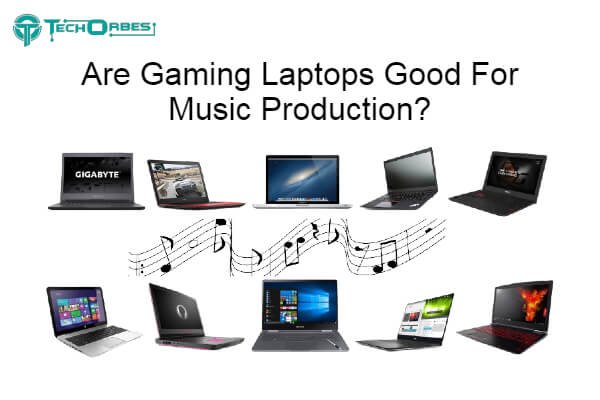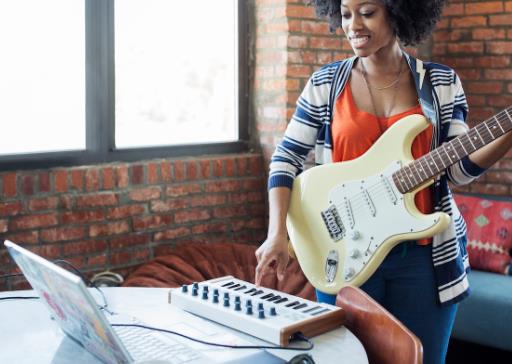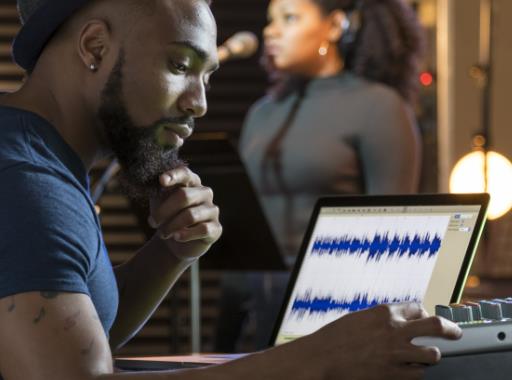Are Gaming Laptops Good For Music Production? Answered
Do you have a gaming PC and want to know if Are Gaming Laptops Good For Music Production? Or are gaming laptops good for recording music? In this article, I’ll go through the advantages and disadvantages of utilizing a gaming computer to produce audio and the computers you should consider.
Is it possible to make music on a gaming computer? Due to their high hardware specifications, gaming machines can be utilized to produce music. Gaming computers, on the other hand, can generate a lot of noise.
A gaming computer might be an excellent machine for producing music if the fan speeds are reduced and the sound levels are controlled. A gaming PC is ideal for music creation since it has everything you need to create great music. The graphics card is the only component of a gaming computer that you do not require.
Are Gaming Laptops Good For Music Production?
Gaming laptops are useful for music production, but they aren’t perfect. The most critical aspect of music production is a decent processor. At the very least, a quad-core CPU with reasonably fast clock speeds can perform a variety of jobs, and you can scrub the timeline in real time without having to wait.

All gaming laptops have a decent processor, if not top-of-the-line, and retain decent clock rates over time. They can stay relatively cool while under strain, and upgradability is a key feature of gaming laptops. In some computers, you may go all out and install up to 64GB of RAM.
Music Production On A Gaming Computer
The graphics processing unit (GPU) is at the heart of gaming computers. They do, however, have more RAM and more processing power. The sole characteristic of a gaming computer that makes it unsuitable for music production is that it produces a great deal of noise.
When recording with open microphones, gaming machines have fans that apply much pressure on the workstation, which might degrade audio quality. This may not be a major concern if you enjoy electronic music.
Because electronic music doesn’t often require the use of a microphone, extraneous disturbances such as room noise or computer fan noises aren’t an issue. If you’re recording vocals, you should take special care to ensure that your room and computer are silent, as this can interfere with your recordings.
You’ll want to record your vocals with a studio microphone if you’re a vocalist. I’ve prepared a comprehensive reference on the best microphones on the market and which mics you should use to get the best sound quality. These are the microphones I’ve used in the past and had tremendous success with.
Music Production On A Gaming Laptop Or An Ordinary Laptop
In both cases, the answer is most likely yes. Depending on what you truly want to do. Of course, it all depends on the “kind” of production you’re working on. What will your contributions be? Are you simply connecting already digitized sounds (either overlaying or in sequences)?
If you need to record sounds and convert them to digital data, the recording equipment will impact the quality. The microphones on most laptops (even gaming laptops) are of poor quality. Also, even if you buy more sophisticated microphones, the sound digitizer inside computers is usually of the cheap-and-nasty variety (not much better than the mic on your phone).
Not precisely what you’d use in a studio to record a band’s tunes. You’d need something more professional, which is normally only accessible as an external device or a specialist desktop card.
After that, it’s merely a matter of running applications. When this happens, the memory and processing power are consumed. The gaming laptop may be advantageous in this scenario because it has more of both.
Though I fear professional compositions, even a gaming laptop may be inadequate, depending on how many different tracks you’re mixing, your effects, and so on. You’d be considerably more likely to locate a desktop that meets your needs than a laptop, which would almost certainly be less expensive.
What Are The Cheapest Laptops For Music Production?
For music production, you’ll need a PC with at least a 6th Generation Intel i-series processor, 1 USB 3.0 port, 8GB of RAM, Windows 10, and an ASIO driver. Most PCs nowadays come with 7th Generation Intel Core i5 processors or greater and Windows 10 preloaded.

ASIO4All is a free download only if you require an audio interface (for capturing live instruments). The ASIO driver and USB port aren’t required if you’ll be using VSTs exclusively (and numerous excellent free VSTs are available). However, you’ll still need a powerful processor and enough RAM.
Are Gaming Laptops Ideal For Music Production And Movie Production?
Video production is not one of them. A gaming laptop can be used for video production, although it isn’t optimal. A pro-level video card optimized for rendering would be great for video production. Gaming GPUs are designed to play games, not render.

There is a significant distinction. With a pro-GPU, a video that takes 5 minutes to render on a gaming laptop would take 5 seconds (maybe an exaggeration, but you get the point). Pro GPUs, on the other hand, are lousy for gaming.
How Can I Choose A Good Laptop Or Computer For Music Production?
The impossibility of comparing Macs and PCs directly applies to all industries, not just music. Both have their advantages.
MAC
- The mechanism does not obstruct your progress. Peripherals that state they are compatible with your Mac.
- Lion, in particular, is ideal for audio recording since it allows you to quickly and effortlessly transition between screens (spaces) and apps.
- Many very affordable professional options are available, particularly Logic Pro.
- For live performances, this is rock solid.
- Finding pirated software is more difficult, but the price points are better. Thus, there are more high-quality, independent developers.
- I can leave my studio Mac running in a session for weeks without having to reset it.
PC
- It’s a lot easier to find pirated software these days. Most people I know who use computers do so because they refuse to pay for their equipment.
- Hardware incompatibility concerns caused by a fragmented approach to system design are extremely aggravating. It’s possible that your Firewire card won’t function with your Firewire interface, but it might with another.
- For the same money, you can get more CPU. You’ll probably be able to run more simultaneous reverbs if you run Cubase on a 00 Mac laptop and Cubase on a $2000 PC laptop. However, because the experiences of owning the gadgets are not comparable, this is no longer a spec that matters.
Overall, I would suggest a Mac for music production over a PC. It’s simply a more conducive environment for creativity. Making music on a computer is already a painful experience; dealing with hardware/software issues and having to gaze at an unattractive computer system only adds to the frustration.
Do Laptops For Music Production Need Some Extra Hardware?
It is entirely up to you and what you wish to generate. Even a regular record can be made using just a laptop. FLStudio, Ableton Live, Logic Pro, Cubase, and many others are full-featured DAWs that can turn your laptop into a virtual home studio. Virtual mixing and mastering are also possible with those DAWs. A MIDI keyboard can help you be more dynamic if you’re a professional pianist.
Are Gaming Computers Good For Music Production?
Gaming computers can indeed be well-suited for music production, thanks to their robust hardware capabilities. However, there are some important considerations to keep in mind when determining if a gaming computer is the right choice for your music production needs.
Pros
Powerful Hardware
Gaming computers are designed to handle demanding tasks like rendering high-quality graphics in real time. This power can be leveraged for music production software, which often requires substantial processing power for tasks like virtual instrument processing, audio effects, and real-time recording.
Multi-Core Processors
Many gaming computers come equipped with multi-core processors, which are advantageous for music production tasks and can be distributed across different cores. This can lead to smoother performance when running multiple virtual instruments, effects, and tracks simultaneously.
Ample RAM
Gaming computers tend to have a significant amount of RAM, which is crucial for handling large audio projects. Complex music sessions with numerous tracks and virtual instruments can quickly consume memory, and having ample RAM helps maintain stable performance.
High-Quality Audio Interfaces
Gaming computers often feature advanced audio hardware to provide an immersive gaming experience. These high-quality audio interfaces can also benefit music producers by providing low-latency and high-resolution audio input/output, essential for accurate monitoring and recording.
Cons
Potentially Unnecessary Graphics Power
Gaming computers often prioritize graphics performance, which might result in higher costs due to advanced graphics cards that music production software doesn’t heavily rely on. This can lead to overpaying for features that aren’t directly relevant to your needs.
Noise and Heat
Gaming computers are designed for performance and can generate significant heat, leading to noisy fans. In a quiet music production environment, this noise can be distracting during recording and critical listening.
Form Factor
Some gaming computers have large, flashy cases that might not fit well in a compact studio setup. If space is a concern, consider a more compact form factor.
Software Optimization
While gaming computers are powerful, some music production software might be better optimized for specific hardware configurations commonly found in professional audio workstations.
Gaming computers can be excellent choices for music production due to their powerful hardware and performance capabilities. However, it’s essential to consider your specific needs and preferences, weighing factors such as budget, space, and the type of music production tasks you’ll be performing. If you’re focused on music production exclusively, it might be worth exploring dedicated audio workstations as well.
Conclusion
To conclude, Are Gaming Laptops Good For Music Production? Gaming computers are unquestionably excellent for music composition. According to my specifications, I only need 8 GB of RAM and no graphics card because you don’t need a graphics card for music unless you plan to play games on it.
I recommend purchasing an ordinary 4 GB RAM laptop with integrated graphics and upgrading the RAM later, as this will be much less expensive than purchasing a gaming laptop.
Frequently Asked Questions
Is it possible to use an HP gaming laptop for music production?
The HP ENVY 17-inch touchscreen laptop comes with sophisticated audio to help your music sound as good as it can on a laptop speaker. It has an Intel Core i7 CPU with a speed of up to 4 GHz.
What is the minimum amount of RAM required for music production?
Audio jobs are surprisingly tolerant of your system’s memory, despite how critical RAM may appear. For the majority of music production processing, 8 GB is sufficient. If you want to work with big sample libraries to replicate acoustic instruments properly, 16 or 32 GB can help.
Are 16 gigabytes of RAM sufficient for music production?
For 99 percent of producers, 16GB of RAM, a solid-state hard drive, a processor speed of 3.0GHz, and many terabytes of storage will be enough. On the other hand, some people will desire to go above and above. Anything more than 16GB of RAM for a new producer would be excessive.
Is an Alienware laptop suitable for music creation?
Dell’s Alienware series laptops are meant for intensive gaming, but their specs list is ideal for music creation.

Rayssa is a native American. A group of specialized individuals raised her with a passion for gaming. Here she discovered that computer games can expand your creative mind to infinite possibilities. In recent years, she has gone beyond gaming as a means of entertainment to enjoy it as a passio
